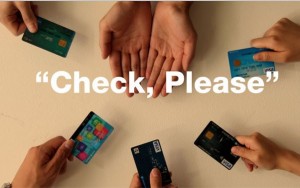 Imagine – you have just enjoyed a delicious meal at an all-you-can-eat KBBQ place with seven other friends. The waitress retrieves the side dishes before bringing the check.
Imagine – you have just enjoyed a delicious meal at an all-you-can-eat KBBQ place with seven other friends. The waitress retrieves the side dishes before bringing the check.
Now, who pays for the meal?
Food is an integral part of culture and social bonding. But what happens after you’ve shared a meal is also determined by culture. Let’s examine four common standards that determine who pays for the meal in Korean culture.
#1 “I’ll pay for the meal, because I am older.”
In a culture that very much values respect for elders, age plays an important role in cultural situations. Being older is usually associated with increased financial stability. It makes sense that someone who is making a steady income through a professional career pay for lunch, rather than the college student who is probably taking out loans to pay for school.
There is also a sense of responsibility and an expectation that the older person should take care of the younger one, which explains why the older person will usually offer to pay for the food.
#2 “I’ll pay for the meal, because I am a guy”
Yes, this is a manifestation of a double standard based on gender. In Korean culture, there remains an expectation that during a date, the guy treats the girl by paying for the meal. However, this cultural norm is slowly but surely changing.
#3 “I’ll pay this time. You can pay next time.”
Unlike American culture which is mainly individualistic, Korean culture is very communal. Paying for the meal is an expression of gratitude and appreciation, an act of kindness and generosity. Therefore, instead of calculating who pays how much to the exact penny, it is common for Korean people to operate on more lenient, general terms.
Frequently in a two-people relationship, one party will pay for lunch this time, and the other will pay the next time. Eventually (and hopefully), it will even out in the end. The exact amount paid is of secondary importance. What matters most is the relationship and the communal aspect of sharing the meal.
#4 “How about we split the bill?”
Korean culture has recently moved away from the three traditional ways of paying for a meal, described above.
Korean people are leaning more and more towards splitting the bill. Girls who offer to pay for half the meal on a date are now deemed as “modern,” “sensible,” and “attractive.” And paying for what you ate and what you ate only can be interpreted as another sign of “Westernization.”
How do you usually split the bill? Next time you go out to eat in a group, pay attention to how culture might have shaped the practice in which you pay for your lunch!
By Hajin Lily Yi




